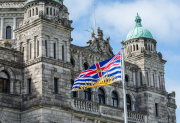Let's say you have a neighbour who tells you she cares deeply about the environment. What would your response be if she traded in her fuel-efficient car for a gas-guzzler? You might begin to question her commitment to fighting climate change.
The same holds true when trying to assess the climate leadership of a political party.
British Columbians have made it clear that they are committed to taking action on global warming. Emboldened by this support, the B.C. government has demonstrated continental leadership by legislating reductions in carbon pollution, shifting taxes away from British Columbians' income and onto pollution (reducing taxes on a good thing and increasing them on a bad one), and banning dirty coal-fired power plants. B.C. now has a target to reduce annual carbon pollution by 37 million tonnes by 2020, and we have taken important steps toward delivering these results.
The foundation for meeting these targets is the carbon tax. It lets industry, business and individuals know that green choices are good and dirty choices are bad. Without it, achieving our targets becomes almost impossible, which is why the B.C. NDP's recently released election platform needs to go back to the drawing board.
If it wins the election on May 12, the NDP proposes to repeal the current system, which covers 76 per cent of British Columbia's carbon pollution, and replace it with a limited cap on industrial polluters that addresses just 32 per cent at best. This weak and relatively vague proposal is a huge step backwards. Returning to our analogy, the NDP is, in effect, proposing to scrap fuel-efficient cars in favour of gas-guzzlers.
As with the B.C. Liberals and Greens, the NDP promotes a number of other measures such as revised building codes, retrofit programs and improved vehicle standards. All of these ideas are important, and while they would serve as excellent complements, none comes close to replicating the results that we are starting to see with the carbon tax.
In less than a year, the carbon tax is beginning to show the fundamental shifts that scientists and economists tell us are critical to address global warming.
Municipalities are making investments in green infrastructure - both Whistler and Dawson Creek are now undertaking major green-energy projects for their buildings. Families in record numbers are making their homes more energy-efficient - in the past year, home-energy retrofits in B.C. were 25 per cent higher than the previous peak. And companies are looking to technologies that didn't have a business case last spring, such as Spectra Energy's plans to capture carbon at its Fort Nelson gas processing plant.
Over time, this innovation and shift toward clean-energy solutions will become more pronounced as the carbon price is strengthened. The carbon tax is already tackling climate change and laying the foundation for a greener future for our communities and families.
By implementing a price on carbon pollution, B.C. is well-positioned to not only compete but to lead the way in the low-carbon economy of the future. U.S. President Barack Obama has asked Congress to pass legislation that effectively places a price on carbon pollution. Draft legislation that has now been put forward would penalize products at the border if they come from a jurisdiction that doesn't impose comparable costs on pollution.
Further, President Obama's budget stimulus is directing unprecedented support toward advancing renewable energy and energy efficiency, putting people to work in green jobs building a clean-energy future. B.C. has foreseen this new reality and must continue to actively prepare itself to compete in the green economy. That's a competitive advantage too precious to lose.
The NDP promise to "axe the gas tax" is an irresponsible recipe to axe the green future B.C. is now building.
Any debate over the carbon tax should be about how to ensure that it is increased equitably over time so we can have long-term success in tackling climate change. We should be debating the extent of social safeguards to protect low-income families and trade-exposed industries. This discussion would offer real value to British Columbians.
Before the end of this provincial election campaign the B.C. NDP needs to reconsider its position on the carbon tax if it wants to demonstrate the climate leadership our province requires.
Instead of getting drawn into a "one step forward, two steps back" affair, British Columbians need - and deserve - a forward-looking debate that builds on the steps we've taken so far.
Karen Campbell, Staff Counsel & Director, Strategy, Pembina Institute
Ian Bruce, Climate Change Specialist, David Suzuki Foundation
Merran Smith, Climate Director, ForestEthics





